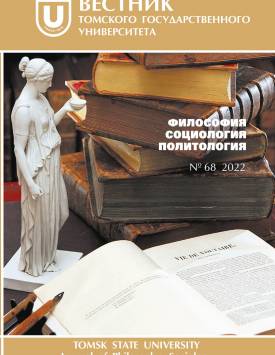Civilization and politics as categories of permanent modernity
The phenomenon of modernity excite people, presumably, from the moment when a person became a reflexive being: perceiving himself as a creature living in time and space, surrounded by other objects and subjects; as an active creature. Acting and speaking. Language - is a way of encrypting / decrypting the world - in time immemorial turned out to be the cornerstone of the appearance of a person / subject, and together with a person / subject and modernity as situation of existential problematization of the current moment of individual life. A man as a subject has existed since the emergence of language and reflective consciousness. Likewise, modernity, which is the primary element of culture and civilization, is eternal to man: from the link man-time, subject-modernity, culture arises, civilization is born, all forms of human existence arise. Modernity is a derivative of human rootedness in time. Hence its permanent character: it is the result of a human-human dialogue and human reflection, permanently unfolding in time. Hence, permanent modernity, which structurally, as shown in the article, consists of the following elements: 1) civilization (foundations set by conditions and reflected in the mentality, assimilated a priori), 2) modernity (a stable value scale of civilization, expressed in artistic practice and forms of political request, including at the level of theses: “time is money”, “Reason, Emancipation, Progress”, etc.), 3) culture (forms of social life in modern conditions, accepting micro- and macro-forms), 4) postmodernity (situations groping for new foundations, unfolding in the horizon of culture, but with the goal of modernity and civilization), 5) the intercivilizational era (the position of breakdown), 6) the subject (a person who realizes his own self and creates a project for a social future), 7) a multitude (a community of followers, emerging around the subject), 8) politics (procedures for the implementation of modernity in the field of intersubjectivity, the final mechanism of cultural transformation, where do not merge love, philosophy and art, and the main movers are the subject, utopia and revolution, hidden in the space of everyday life). At the same time, civilization and politics form a static-dynamic whole, within the boundaries of which culture in the broad sense of the word develops and unfolds. The author declares no conflicts of interests.
Keywords
modernity,
modernity,
postmodernity,
culture,
civilization,
politicsAuthors
| Maltsev Yaroslav V. | Tyumen State University | maltsevyaroslav@gmail.com |
Всего: 1
References
Freund W. Modernus und andere Zeitbegriffe des Mittelalters // Koln and Graz: Neue Munstersche Beitrage zur Geschichtsforschung. 4. 1957. S. 27-40.
The American Heritage Dictionary of the English Language, Fifth Edition // American Heritage Dictionary. URL: http://www.ahdictionary.com/word/search.html?q=modern&submit.x=0&submit.y=0 (accessed: 09.01.2021).
Бодлер Ш. Об искусстве. М. : Искусство, 1986. 422 c.
Weber M. The Theory of Social and Economic Organization. Glencoe, Ill.: The Free Press; The Falcon’s Wing Press, 1947. X. 436 p.
Хабермас Ю. Философский дискурс о модерне. Двенадцать лекций. М. : Весь Мир, 2008. 416 с.
Гидденс Э. Последствия современности. М. : Праксис, 2011. 352 с.
Лиотар Ж.-Ф. Состояние постмодерна. М. : Алетейя, 2014. 160 с.
Лиотар Ж.-Ф. Постмодерн в изложении для детей: Письма: 1982-1985. М. : Рос. гос. гуманит. ун-т, 2008. 145 с.
Гречко П.К. Интеллектуальный импорт, или О периферийном постмодернизме // Общественные науки и современность. 2000. № 2. С. 166-177.
Павлов А.В. Цивилизация и межцивилизационная эпоха // Вестник Пермского университета. Философия. Психология. Социология. 2012. № 3. С. 17-27.
Павлов А.В. Межцивилизационная эпоха. Поколение выбора // Социум и власть. 2016. № 3 (59). С. 17-24.
Бауман 3. Текучая современность. СПб. : Питер, 2008. 240 с.
Павлов А.В. Образы современности в XXI веке: сверхмодернизм // Философия и современность. 2019. № 1. С. 69-83.
Kirby А. The death of postmodernism and beyond // In Philosophy now: A magazine of ideas, L. 2006. № 58. P. 34-37.
Hutcheon L. The Politics of Postmodernism. New York ; London : Routledge, 2002. 222 p.
Hassan I. Beyond Postmodernism: Toward an Aesthetic of Trust // In Modern Greek Studies (Australia and New Zealand). 2003. Vol. 11. P. 303-316.
Хобсбаум Э. «Масштаб посткоммунистической катастрофы не понят за пределами России» // Научно-просветительский журнал «Скепсис». URL: https://scepsis.net/library/id_421.html (дата обращения: 12.01.2021).
Емельянов В.В. Ценностные системы культур Востока: между нормой и идеалом // Идеалы. Ценности. Нормы : материалы VI Междунар. науч. конф. по востоковедению (Торчиновские чтения). 3-6 февраля. 2010. С. 7-19.
Чупров А.С. Культура и цивилизация: тождество противоположностей // Социум и власть. 2020. № 5 (85). C. 95-104.
Андерсон Б. Воображаемые сообщества. Размышления об истоках и распространении национализма. М.: КАНОН-пресс-Ц : Кучково поле, 2001. 288 с.
Бадью А. Восточный ветер сбивает западную спесь // URL: https://www.strategium.ru/forum/topic/12090-vostochnyiy-veter-sbivaet-zapadnuyu-spes/(дата обращения: 05.01.2021).
Камю А. Сочинения : в 5 т. Харьков : Фолио, 1998. Т. 5. 410 с.
Павлов А.В. Перспективы неомодерна. Философия новой эпохи // Социум и власть. 2017. № 2 (64). С. 85-90.
Бадью А. Философия и событие. Беседы с кратким введением в философию Алена Бадью. М. : Институт общегуманитарных исследований, 2013. 192 с.
Бадью А. Манифест философии. СПб. : Machina, 2003. 184 с.
Бадью А. Рапсодия для театра. Краткий философский трактат. М. : Модерн, 2011. 96 с.
Ленин В.И. Полное собрание сочинений. М. : Изд-во полит. литературы, 1981. Т. 41. 696 с.
Бадью А. Загадочное отношение философии и политики. Ин-т общегуманитарных исследований, 2013. 112 с.

